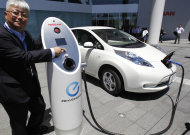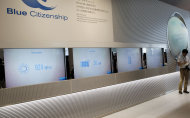Monday, July 11, 2011
Wednesday, August 5, 2009
Nissan Unveils Electric Car, to Be Available Next Year...The Leaf

Nissan plans to start selling a new battery-powered all-electric car, the Leaf, next year in Japan, Europe and the United States.
YOKOHAMA, Japan (Reuters) — Nissan, Japan’s third-largest automaker, took the wraps off its much-awaited electric car on Sunday, naming the hatchback the Leaf.
Nissan and its French partner, Renault, have been aggressive proponents of pure electric vehicles with no emissions, announcing plans to mass-market the clean but expensive cars globally in 2012.
Nissan will begin selling the first Leaf cars in the United States, Japan and Europe toward the end of 2010, adding two more models soon after. It expects production to start with about 200,000 units a year.
Coordinating the car’s introduction with the inauguration of Nissan’s global headquarters in Yokohama, south of Tokyo, the chief executive, Carlos Ghosn, drove up to the stage in a sky-blue Leaf prototype. Nissan is returning to the port city of Yokohama, where it was founded in 1933, after being based in Tokyo’s high-end Ginza shopping district for 41 years.
Hurt by sliding vehicle sales worldwide since the financial crisis hit last year, Nissan has suspended its goals set under a midterm business plan, with the exception of its aggressive push into electric cars.
With oil prices topping $60 even in a recession and environmental regulations tightening all the time, Mr. Ghosn said he was optimistic about electric vehicles entering the mainstream, expecting them to represent one in 10 new cars globally by 2020.
Other automakers like Toyota and Volkswagen have announced plans to start producing electric cars, but they say it could take decades for the vehicles to spread because of their high cost, limited driving range and long charging times with the current battery technology.
Nissan did not announce pricing for the five-seater Leaf, but Mr. Ghosn said the price, without the expensive lithium-ion battery that Nissan is considering leasing, would be within the range of a comparable gasoline-engine car.
The Leaf has a top speed of more than 76 miles an hour and a cruising range of at least 100 miles — a distance that covers the needs of 80 percent of drivers, Nissan said.
The carmaker has lagged its domestic rivals Toyota and Honda in offering hybrid cars, which have taken the Japanese market by storm this year with the help of government stimulus steps.
For years, Mr. Ghosn has played down the importance of hybrid cars — both for consumers hoping to save money at the pump and for manufacturers looking to make profit. But in what could signal a shift in strategy, Mr. Ghosn said Nissan would reserve the option of offering hybrid vehicles if the market demanded it.
Posted by gjblass at 3:54 PM 0 comments
Labels: electric car, electric cars, hybrid cars, Nissan Leaf






